Politics
Will Cristina Garcia’s career tank after calling John Perez a ‘homo?’
Former Gov. Bill Richardson still hasn’t lived down saying “maricon’
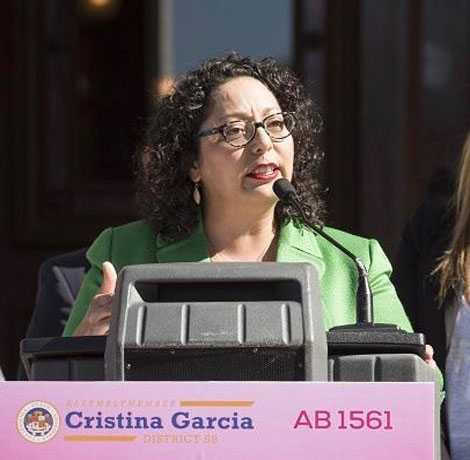
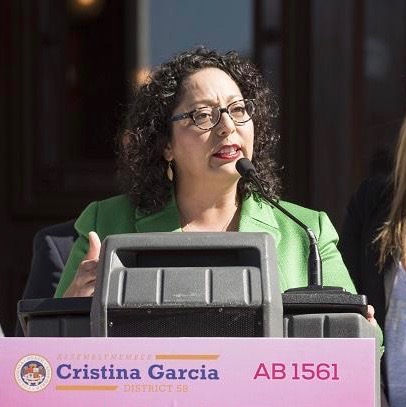 On her Twitter page, California Assemblymember Cristina Garcia calls herself “Reformer, community activist, math lover and teacher.” In her AD 58 office in Sacramento and on the radio, she called Los Angeles-based gay Assembly Speaker Emeritus John Perez a “homo.” While “very disturbed” by the divisive slur, Perez is more concerned about its harmful impact on closeted LGBT staffers and what it says about the legislator’s real attitudes.
On her Twitter page, California Assemblymember Cristina Garcia calls herself “Reformer, community activist, math lover and teacher.” In her AD 58 office in Sacramento and on the radio, she called Los Angeles-based gay Assembly Speaker Emeritus John Perez a “homo.” While “very disturbed” by the divisive slur, Perez is more concerned about its harmful impact on closeted LGBT staffers and what it says about the legislator’s real attitudes.
Garcia, who represents Bell Gardens, told KQED on Monday, March 26, that she sees nothing wrong with using the word “homo,” suggesting that lawmakers should have a “safe space” to talk “candidly” about colleagues, which apparently includes using slurs. But after being outed by Politico, Garcia apologized for calling Perez a ‘”homo” five years ago.
“I did make that remark in a moment of anger. I have no reason to lie about something that is true,” Garcia said in a statement. “However, in no way was my use of that term meant to belittle Mr. Perez for his sexuality….I have a long and chronicled history of being a straight ally of the LGBTQ community.”
“I realize that words can be harmful and I humbly and sincerely apologize to Mr. Perez and any member of the LGBTQ community who feels offended by the comment,” Garcia added.
But it’s the casualness with which the slur was used that may prove unforgivable if the LGBT community and allies think the unthinking use of such pejorative terms actually reflect Garcia’s true beliefs, uncensored by political expediency. To LGBT people, such slurs are not just a matter of an “authentic” politician being politically incorrect. Pejorative terms like “homo” and “faggot” are not meant just to harm and offend: they are intended to dehumanize. Like a hate crime, they target not just the person being called “homo” or “faggot,” but the whole LGBT community. And they are not easily forgotten.
Take what happened to New Mexico Gov. Bill Richardson, for instance. In 2007, Richardson was receiving a lot of positive attention as he ran for the Democratic presidential nomination, garnering an endorsement from powerful LA County Supervisor Gloria Molina and receiving warm consideration from then-labor leader John Perez. While not expected to win the nomination, he was high on the short list as a vice-presidential pick.
But Richardson’s popularity among LGBT politicos came to a screeching halt after this reporter and former Washington Blade editor Chris Crain wrote about Richardson’s casual use of the gay pejorative “maricon” during a March 2006 appearance on the Don Imus radio show. Richardson immediately called Equality New Mexico, which was pressing him to sign two domestic partners bill, apparently claiming that he understood “maricón” to mean “effeminate,” not “faggot,’ which was the general US understanding of that word. By the time he ran for president, Richardson’s non-apology apology turn “maricon” into meaning simply “gay.”
“It has been brought to my attention that the word also has a hurtful or derogatory connotation, which was never my intent,” Richardson at the time. “If I offended anybody, I’m sorry.”
Richardson’s pro forma apology evaporated during the HRC/LOGO Democratic presidential forum where he responded to a question from Melissa Etheridge saying he thought being gay was a choice. There was an audible gasp in the LGBT audience. Though he immediately tried to clarify, it was clear that the LGBT community would not back Richardson and would scorch any Democrat who gave him a pass.
That may not happen with Garcia. But the assemblymember has more to explain than why the self-described LGBT ally used the slur “homo” at all. And, according to a formerly closeted male staff member caught up in the Assembly investigation into claims of sexual harassment against her, Garcia has called Perez a “faggot,” too.
The investigation has thrown Garcia supporters into confusion. After all, she was a leader of California’s #MeToo movement, which landed her on the cover of Time magazine. But it has also brought into sharp relief the fact that inappropriate behavior toward male staffers constitutes sexual harassment, just as much as it does towards women.
Daniel Fierro, a then-25-year-old staffer to Assemblymember Ian Calderon, claims that in 2014, an apparently inebriated Garcia cornered him in the dugout after an Assembly softball game and “began stroking his back, then squeezed his buttocks and attempted to touch his crotch before he extricated himself and quickly left,” Politico reported last February.
Fierro kept quiet until the #MeToo movement and new whistleblower protections for legislative staffers prompted him to tell Calderon, who referred the matter to the Assembly Rules Committee for investigation.
“If the person leading the charge on [sexual harassment] isn’t credible it just ends up hurting the credibility of these very real stories,” Fierro told the AP.
The day after the Politico report, Garcia went on an unpaid leave of absence.
“Upon reflection of the details alleged, I am certain I did not engage in the behavior I am accused of. However, as I’ve said before, any claims about sexual harassment must be taken seriously, and I believe elected officials should be held to a higher standard of accountability. Therefore, I am voluntarily taking an immediate unpaid leave from my position in the State Assembly, including any accompanying committee assignments, so as not to serve as a distraction or in any way influence the process of this investigation,” Garcia said in a statement Feb. 9. “I implore the Assembly Rules Committee to conduct a thorough and expeditious investigation, and I look forward to getting back to work on behalf of my constituents and for the betterment of California.”
But new allegations surfaced claiming that Garcia “urged staffers to play ‘spin the bottle’ after a political fundraiser,” according to Politico on Feb. 18. https://www.politico.com/story/2018/02/18/california-metoo-allegations-legislator-416916
“It was definitely uncomfortable,’’ David John Kernick, 38, who worked for Garcia for five months in 2014, told Politico. He’s filed a formal complaint with the California Department of Fair Employment and Housing asserting that Garcia charged him with insubordination after questioning the propriety of trying to engage staffers in that kissing game in a hotel room after a night of heavy drinking. He says he lost his district office job two days later.
Kernick and three other ex-staffers sent an open letter to Assembly Speaker Anthony Rendon complaining about the “toxic” workplace environment “where activities included regular heavy drinking with staffers, sexually charged meetings and raunchy conversations highlighting intimate details of her sex life,” Politico reported.
The day after the Politico story, on Feb. 19, a letter critical of Kernick, signed by Garcia’s 2014 Chief of Staff Tim Reardon, was taken from Kernick’s personnel file and circulated around the State Capitol. “Obviously, it’s improper. It’s a violation of privacy, and it does nothing to counter the narrative for a boss that was accused of being very vindictive. In fact, it seems to confirm it,” Christine Pelosi, the legal counsel for #WeSaidEnough movement, told Politico. “Whoever thought they were helping Cristina Garcia did her no favors.”
On Monday, Kernick challenged Garcia’s denial in the KQED radio interview (transcript below) about using the word “faggot.”
“I don’t use the ‘faggot.’ It’s not in my vocabulary,” she told KQED. “I think that terms like ‘faggot’ are purely derogatory. There’s no good way to use that word.”
Kernick told Politico that Garcia’s denial about never using that word was “a bald-faced lie.”
“The ex-Marine said he is a member of the LGBT community, but he was not out when he worked for Garcia – and so had to remain silent when he ‘routinely’ heard Garcia use both those words [‘homo’ and ‘faggot’] ‘distinctly about the speaker [John Perez], but it was also part of her regular vocabulary. It wasn’t unusual. … And so I just had to internalize it. I had no choice.’”
Perez told the Los Angeles Blade that while he is “incredibly disturbed” by the slurs Garcia made about him, he is even more upset at the thought of the harm done to closeted staffers like Kernick who fear calling out the homophobia lest they lose their jobs.
“I’m incredibly disturbed by the interview I heard on KQED and a pattern of rationalization and minimization of the impact of the use of homophobic language,” Perez said by phone Tuesday while on vacation in Japan. “The lack of appreciation for the impact on staff—and quite frankly, for every kid in society.”
Perez recalled growing up thinking gay people would never be elected until Sheila Kuehl became the first out LGBT person elected to the Assembly in 1994.
“I never thought I’d have the opportunity to succeed her some day and advance to be Speaker,” he said. “But one of the reasons I felt that way was because of the pervasive and pernicious nature of homophobia in society.
“And so it’s so disturbing—despite all the progress we’ve made—to see this additional example of homophobia in the workplace,” Perez continued. “Not because it was a negative statement about me. I assumed as Speaker of the Assembly that at some point every member would be upset with me about something and be angry at me and say something angry. But it is different to say something in anger, something in frustration based on facts and based on circumstances than it is to immediately go to base-level homophobic attacks. Because when you go to base-level homophobic attacks—not only is it an attack on that individual—but it’s attacking the whole community. And it’s borne out of a notion of dehumanizing us based on that which makes us unique.”
The impact of the slurs are an injustice toward “those hearing them directly and indirectly and what it means for a young gay or lesbian or bisexual or transgender staff or even more so, a closeted member of our community hearing these kinds of comments in the workplace and what that means to have a thriving career is particularly bothersome,” Perez said.
“I’m hopeful that the fact-finders [in the sexual harassment allegations] will look into this as they look into the totality of the allegations,” Perez said, “because of the impact on staff. And quite frankly, what it means for how we view people and whether we see our obligation to represent everybody. It’s hard to reconcile divisive language with the notion of representing all people and our constituencies.”
“I do not comment on ongoing investigations,” Assembly Speaker Anthony Rendon told the LA Blade. “That said, using homophobic language is inappropriate and indefensible. Words have consequences and can cause harm. Officials who are elected to represent everyone in their districts should know better and do better.”
Assemblymember Evan Low, Chair of the California LGBT Legislative Caucus, said: “It’s disappointing to hear a respected former Speaker be subjected to hurtful homophobic comments. It’s upsetting but not surprising—it reflects the everyday struggles that our LGBT community faces on a daily basis. We must continue to work to educate others about the importance of eradicating all forms of homophobia—and the ignorance and bigotry behind them.”
The California Democratic Party endorsed incumbent Garcia via their consent calendar. But neither out CDP Chair Eric Bauman nor out LA County Democratic Party Chair Mark Gonzalez are happy with Garcia.
“The use of pejorative terms of any kind is ALWAYS unacceptable, even more so from those who claim to speak to others about morality from on high. This is positively unacceptable and attempts to rationalize, minimize or mitigate the pain caused by the use of slurs only makes it even more offensive,” said Bauman.
“Assemblymember Garcia’s comments regarding the homophobic language she used to refer to openly gay members of the Assembly were offensive, to say the least. The fact that Ms. Garcia justified using homophobic language is a poor defense for actions taken as an adult and leader in the community. She has stood behind the LGBT community in her record as a legislator, but as a leader of California, Assemblymember Garcia and all elected officials need to show that they walk the talk. Language contrary to what one has a history of standing up for has a chilling effect on staff and on the community,” said Gonzalez. “Any language that is derogatory or inflammatory is unacceptable,” said Gonzalez.
Will all the outrage matter? Garcia has given no indication that she is thinking of resigning, though the outcome of the Assembly’s investigation may change that. And as of now, the only Democrat who has announced an intention to challenge Garcia in the June primary is a gay man, John Paul Drayer of Bellflower, a former member of the Cerritos College board of trustees who filed papers on Feb. 12.
“Having effectively no representation in the state assembly 58th District we need new ideas & candidate to turn around the drunken misguided culture of being too close to Sacramento lobbyists,” Drayer wrote in an email to the Downey Patriot. “Therefore I am seriously thinking about running for this effectively vacant seat. Plus I encourage many others to run in a strong debate about fixing Sacramento to work for working families & small businesses with tax cuts from our large surplus. I will protect the 5th amendment due process rights of men & women equally. No gender should be above another.”
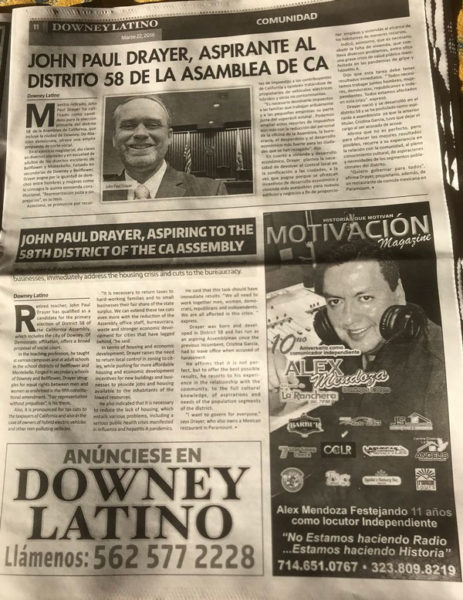
There is a bit of confusion over this, however, since Drayer boasted on Twitter about newspaper cover of his Assembly challenge on March 24—but on March 13 he posted @drayerpaul:
Mor
“I filed for the Special Election to fill the unexpired term in the CA State Senate 32nd District on June 5th.”
Here is the link to a clip of Christina Garcia’s interview on KQED:
Here’s the transcript:
KQED: “The other thing I heard that might be concerning for some people in the Capitol and perhaps some people in your district is this idea that you use slurs or something other than respectful word to describe the former Speaker of the House (sic) who is gay, and other folks. Did you ever use slurs like ‘faggot’ or ‘homo?’ Did you ever say anything like that to your staff?
Cristina Garcia: Oh, I will be clear. There’s no one in politics who doesn’t talk about some of the peers we work with and we use candid language. And so along the way, I’ve used candid language – I curse. I mean, I’ve been vocal about some of my (?) words – I don’t know if I can say them on the radio. And you know, if I see staff who didn’t want to engage in that kind of conversation, I would stop. But they never seemed to have any problem with it. But even then, it’s pretty limited. But these are in places where you think you’re in a safe space and you can speak your mind and be vocal.
I don’t use the ‘faggot.’ It’s not in my vocabulary. But at some point, have I used the word homo. Yeah. I’ve used that word homo. I don’t know that I’ve used it in derogatory context. I think you need to think about the context in which it was used. But anything can be taken out of context, clearly, hearing the situation (?)
KQED: Well, I bring that up – I grew up in a neighborhood where the word homo, for example, people still say ‘no homo’ as a way to express their identity, the masculinity. The reason I’m asking you, though, is there – what has been presented to me as this question of whether these words were used in a professional setting and whether they made people uncomfortable. So did you ever use that to describe the Speaker of the House – the word homo?
CG: I can’t remember but I wouldn’t be surprised if I used that word. Right. So I think that that’s fair. I think that terms like ‘faggot’ are purely derogatory. There’s no good way to use that word. I think the word ‘homo’ can also be derogatory. But I’m not going to sit here and pretend I’m an angel. Was how I was using them in derogatory terms? No. It’s almost like I was saying I’m a brown person sometimes. Am I perfect? I think all of us at sometime have biases but I try to be open and accepting of all communities, including the LGBT community. You can look at my voting record, you can look at the advocacy I’ve been doing well before I was elected in conjunction with not just the LGBT community but with communities that have been marginalized.”
Politics
Honoring Stonewall: A conversation with Senator Toni Atkins on the past, present, and future of Pride
As we commemorate the 50th anniversary of the Stonewall Uprising, the Stonewall Democratic Club honors leaders like Senator Toni Atkins, whose lifelong commitment to equality and public service reflects the enduring legacy and ongoing promise of Stonewall
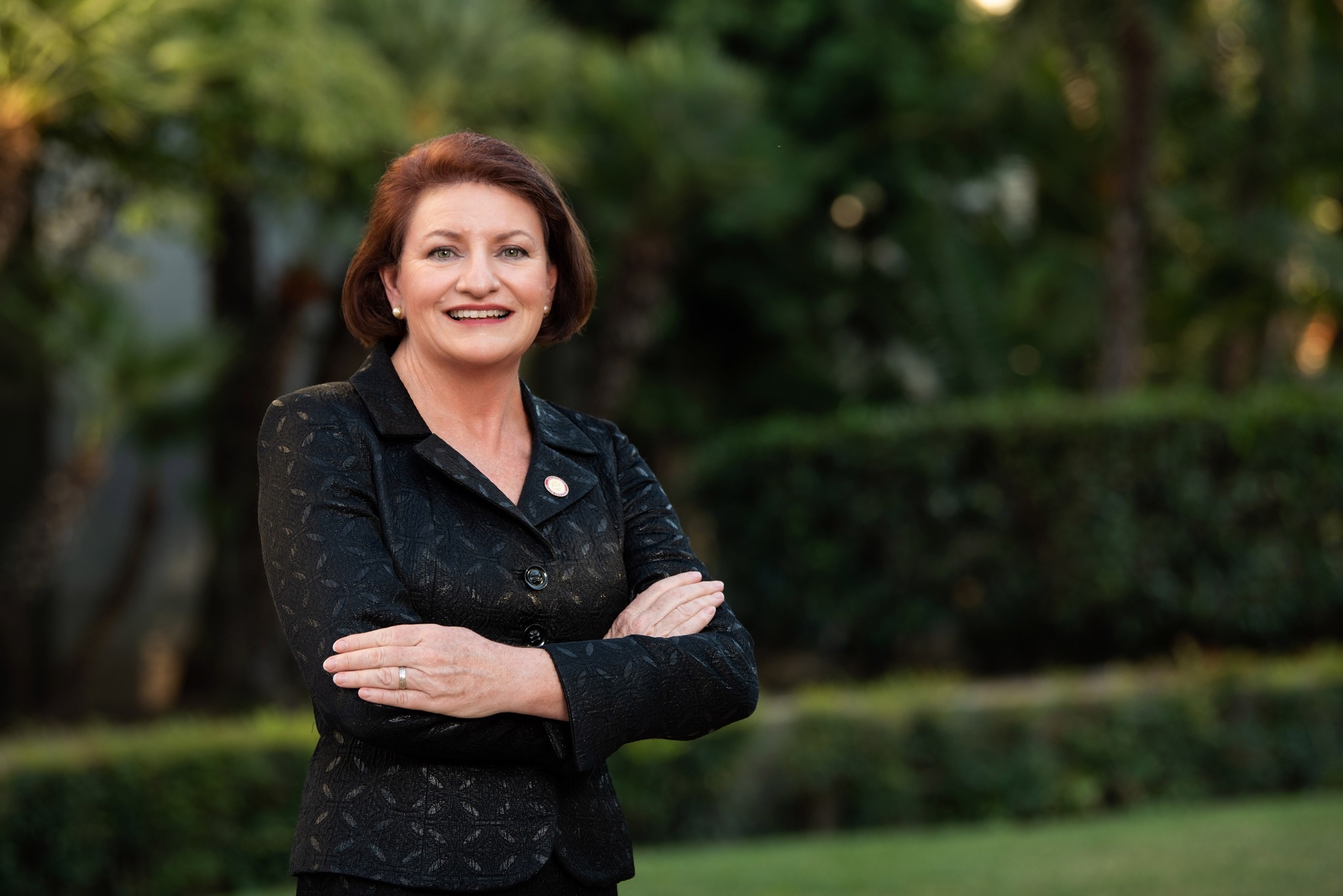
As we rapidly approach the 50th anniversary of the Stonewall Uprising – an inarguably paramount moment that fueled a national movement for LGBTQ civil rights – the Stonewall Democratic Club continues to carry into the future the spirit of that rebellion through advocacy and political action. This milestone also provides our community with an opportunity to reflect on the leaders who have carried that spirit forward, including Senator Toni Atkins, whose decades of public service have been shaped by a resounding commitment to equality and representation of marginalized communities. Her journey, from growing up in rural poverty to becoming one of California’s most impactful legislative leaders, embodies the progress made since Stonewall and the work that still lies ahead for us.
As our community and our country approach the 50th anniversary of the Stonewall Uprising, how does that milestone resonate with you personally, politically, or otherwise?
Personally, I came out at age 17 in a very conservative rural community. I didn’t see other people like me, and I didn’t believe society was built for someone like me. So I am simply grateful to have been part of our movement for civil rights for my LGBTQ+ community. Politically, we have made tremendous gains, and we now face a very intentional and serious backlash. Our work and political engagement are more important than ever.
In your opinion, what do you believe was the most significant achievement that came from Stonewall? What unfinished business do we still have to work on?
The most significant achievement was visibility – seeing our collective strength for the first time.
Today, we must fight to regain the ability to serve openly in the military, protect marriage equality, and hold our hard-won ground. We must continue educating allies and families about the lives and experiences of nonbinary and transgender community members. In many ways, we are refighting some of the same battles.
We also have to work in partnership with other marginalized communities on issues beyond civil rights – income inequality, access to healthcare (including gender-affirming care), educational opportunities, and affordability. The struggle for justice is interconnected.
How do you view the connection between the activism of that time in our country and the modern policy work of the California Legislature?
Activism and organizing were essential then, and they remain essential today. We still have to strategize, organize, and take action. That hasn’t changed.
You have had a long and devoted career in public service in California. What first inspired you to get into politics? How have your own experiences as a queer woman shaped your journey along the way?
Our stories – every one of them – matter. My history has shaped every policy issue I’ve worked on. I grew up in a working-poor family. My parents, three siblings, and I lived in a four-room house with no indoor plumbing. We carried water from a nearby spring to drink, cook with, and bathe. We lacked consistent healthcare. My father was a lead miner; my mother worked as a seamstress in a factory.
Coming out as a lesbian at a young age was another defining part of my story. All of this influenced my work on housing, healthcare, LGBTQ rights, the environment, and labor protections. I saw firsthand how the mines destroyed the environment, how little safety, benefits, or protections my father had, and how families like mine struggled. Much of my political work has been about empowerment – for myself, my family, and others facing similar obstacles.
I entered politics by helping my mentor, Christine Kehoe, get elected to the San Diego City Council in 1993 – the first openly LGBTQ candidate elected to that body. Working with her at City Hall showed me the difference we could make when we had a seat at the table. That was my motivation – not only for the LGBTQ community but for all marginalized communities, working families, and women. I am forever grateful to Chris for giving me a chance to serve.
What moments in your legislative or leadership roles shine brightest in your mind as being most impactful to you?
So many- the Gender Recognition Act, Proposition 1, which I authored to enshrine abortion and contraception into the California Constitution, and Proposition 3, which did the same for marriage equality. The Earned Income Tax Credit (EITC) for working individuals and families. Creating a permanent source of funds for affordable housing. The California Dream For All downpayment assistance loan for people to buy their first home. Support for funding Prep and for community clinics and Planned Parenthood. Increased funding for childcare for working families and increased paid family leave! So many issues and so much good can be done through public policy and budget actions. That is the importance of the political work of the LGBTQ community and our allies!
As the former Speaker and as President ProTem – I have had the ability not just to sit at that table but to actually set the agenda. I’m grateful and honored for the opportunity.
Over the years you have spent in politics, how has your sense of “why I do this work” evolved, particularly in relation to our queer community and broader social justice aims?
I have seen how strategy, organizing, fundraising, and activism empower us to influence policy and budget decisions rooted in shared values. Relationships also matter – the ones we build, the conversations we have, and the listening we do. Those connections make us better and more effective.
Decades ago, we relied heavily on allies because we didn’t have seats at the table ourselves. We must never forget that. There is no shortcut for the crucial, ongoing conversations needed to continue advancing equality.
How would you describe the state of queer rights and representation in California today?
California’s values – in the public and in the Legislature – largely reflect strong support for our community. Still, especially regarding trans rights, we must keep engaging allies and others about who we are as nonbinary and transgender individuals. That is the next frontier of our civil-rights journey.
And our LGBTQ Caucus has never been larger or more effective. Many members, as I once was, are now in positions of real power and influence, moving forward policies that support our community.
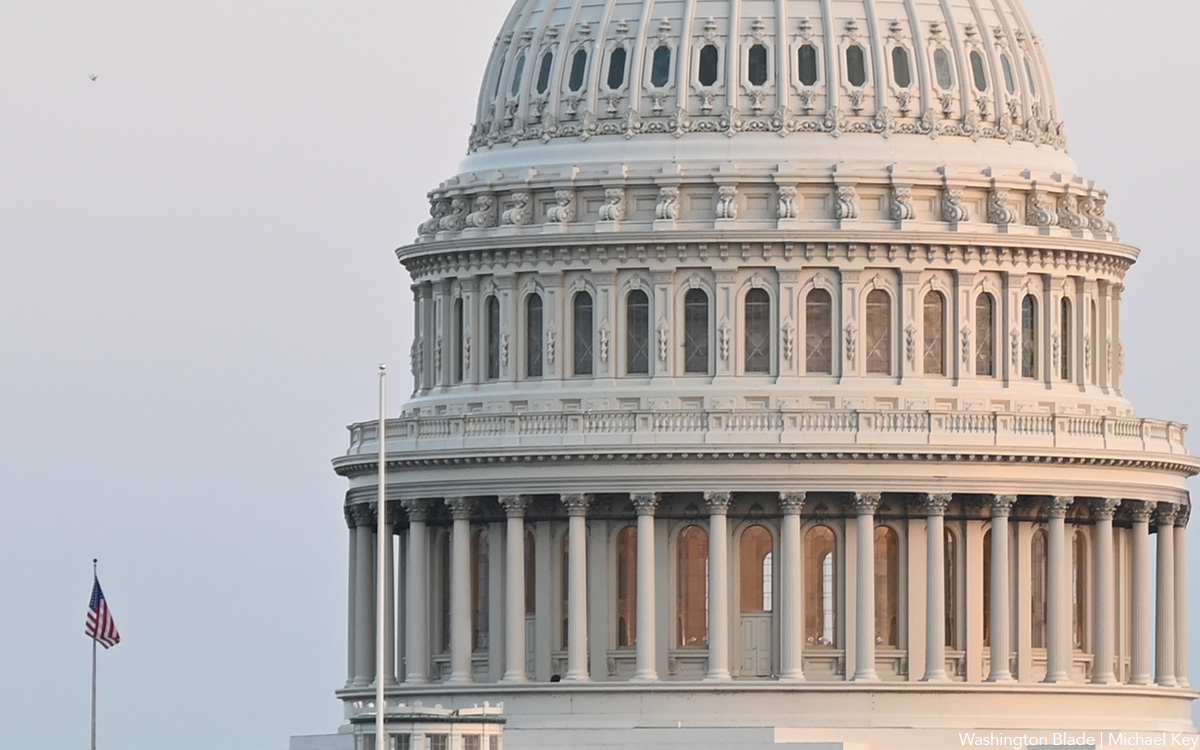
President Donald Trump on Wednesday signed a bill that reopens the federal government.
Six Democrats — U.S. Reps. Jared Golden (D-Maine), Marie Gluesenkamp Perez (D-Wash.), Adam Gray (D-Calif.), Don Davis (D-N.C.), Henry Cuellar (D-Texas), and Tom Suozzi (D-N.Y.) — voted for the funding bill that passed in the U.S. House of Representatives. Two Republicans — Thomas Massie (R-Ky.) and Greg Steube (R-Fla.) — opposed it.
The 43-day shutdown is over after eight Democratic senators gave in to Republicans’ push to roll back parts of the Affordable Care Act. According to CNBC, the average ACA recipient could see premiums more than double in 2026, and about one in 10 enrollees could lose a premium tax credit altogether.
These eight senators — U.S. Sens. Catherine Cortez Masto (D-Nev.), Dick Durbin (D-Ill.), John Fetterman (D-Pa.), Maggie Hassan (D-N.H.), Tim Kaine (D-Va.), Angus King (I-Maine), Jacky Rosen (D-Nev.), and Jeanne Shaheen (D-N.H.) — sided with Republicans to pass legislation reopening the government for a set number of days. They emphasized that their primary goal was to reopen the government, with discussions about ACA tax credits to continue afterward.
None of the senators who supported the deal are up for reelection.
King said on Sunday night that the Senate deal represents “a victory” because it gives Democrats “an opportunity” to extend ACA tax credits, now that Senate Republican leaders have agreed to hold a vote on the issue in December. (The House has not made any similar commitment.)
The government’s reopening also brought a win for Democrats’ other priorities: Arizona Congresswoman Adelita Grijalva was sworn in after a record-breaking delay in swearing in, eventually becoming the 218th signer of a discharge petition to release the Epstein files.
This story is being updated as more information becomes available.

Former Vice President Dick Cheney died of complications from pneumonia and cardio and vascular disease, according to a family statement released Tuesday morning. He was 84.
Cheney served as vice president under President George W. Bush for eight years and previously as defense secretary under President George H.W. Bush. He also served as a House member from Wyoming and as White House chief of staff for President Gerald Ford.
“Dick Cheney was a great and good man who taught his children and grandchildren to love our country, and to live lives of courage, honor, love, kindness, and fly fishing,” his family said in a statement. “We are grateful beyond measure for all Dick Cheney did for our country. And we are blessed beyond measure to have loved and been loved by this noble giant of a man.”
Cheney had a complicated history on LGBTQ+ issues; he and wife Lynne had two daughters, Liz Cheney and Mary Cheney, who’s a lesbian. Mary Cheney was criticized by LGBTQ+ advocates for not joining the fight against President George W. Bush’s push for a constitutional amendment banning gay marriage. She later resumed support for LGBTQ+ issues in 2009, including same-sex marriage, after her father left office in 2009. She married her partner since 1992, Heather Poe, in 2012.
In 2010, after leaving office, Cheney predicted “Don’t Ask, Don’t Tell” would “be changed” and expressed support for reconsideration of the law banning open military service.
In 2013, the Cheney family’s disagreements over marriage equality spilled into the public eye after Liz Cheney announced her opposition to same-sex couples legally marrying. Mary Cheney took to Facebook to rebuke her sister: “Liz – this isn’t just an issue on which we disagree – you’re just wrong – and on the wrong side of history.” Dick and Lynne Cheney were supporters of marriage equality by 2013. Liz Cheney eventually came around years later.
Cheney, a neo-con, was often criticized for his handling of the Iraq war. He was considered one of the most powerful and domineering vice presidents of the modern era. He disappeared from public life for years but re-emerged to help Liz Cheney in her House re-election bid after she clashed with President Trump. Dick Cheney assailed Trump in a campaign video and later Liz announced that her father would vote for Kamala Harris in the 2024 presidential election.
State Department
State Department’s 2024 human rights report could jeopardize LGBTQ+ asylum cases
‘Targeted and malicious act’ will ‘directly endanger lives’
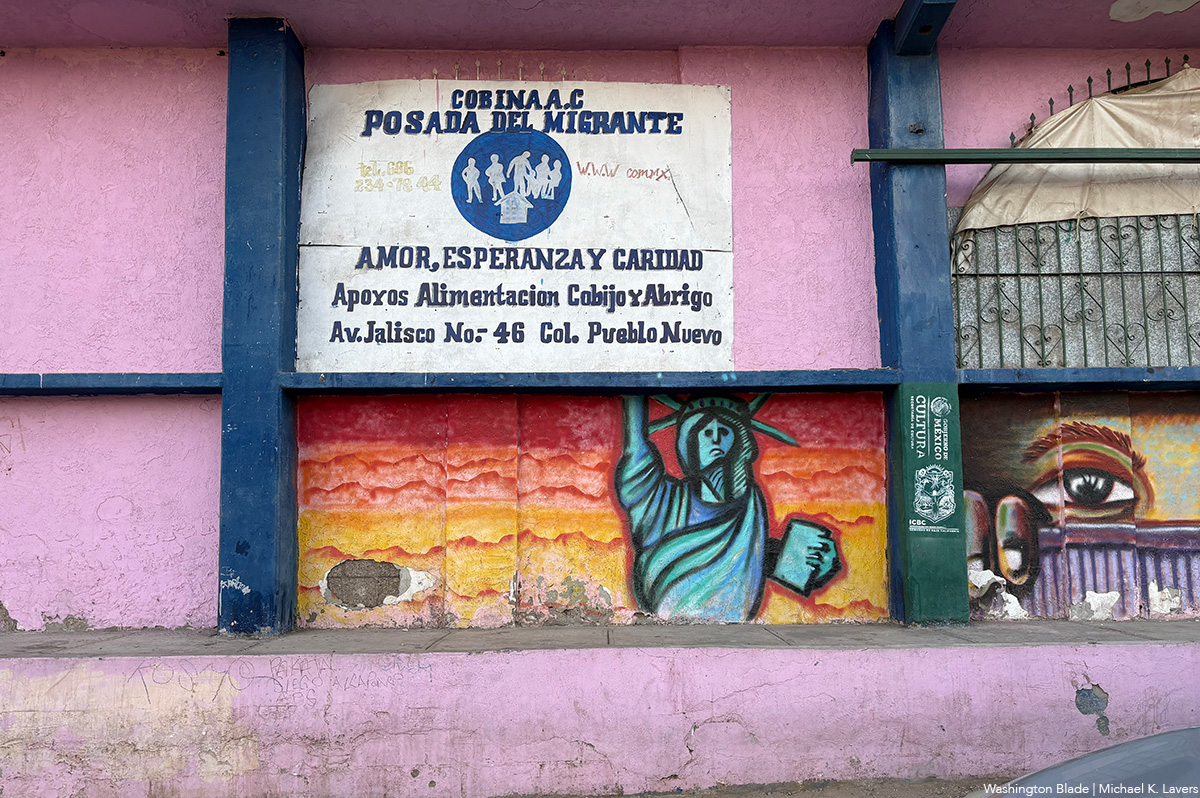
Advocacy groups say the State Department’s 2024 human rights report that “erased” LGBTQ+ people will jeopardize the cases of those who are seeking asylum in the U.S.
Immigration Equality notes the report “serve as key evidence for asylum seekers, attorneys, judges, and advocates who rely on them to assess human rights conditions and protection claims worldwide.”
The 2024 report the State Department released on Aug. 12 did not include LGBTQ+-specific references. Immigration Equality Director of Law and Policy Bridget Crawford in a statement said country-specific reports within the larger report “should be accurate, fact-based, and reflect the lived reality of LGBTQ people — not ignore and actively hide it.”
“When adjudicators see less information in these reports than in prior years, they may wrongly assume conditions have improved,” said Crawford. “In truth, the absence of reporting is a purely political move, not based in fact or reality.”
Organization for Refuge, Asylum and Migration Executive Director Steve Roth in a statement condemned the Trump-Vance administration’s “deliberate erasure of LGBTIQ communities from the 2024 human rights report — an unprecedented move that violates international standards.”
“This is a targeted and malicious act that will directly endanger lives,” he said.
Roth, like Immigration Equality, noted courts “around the world rely on these reports to evaluate asylum claims.”
“Stripping out documentation of LGBTIQ persecution removes a vital tool in assessing claims for protection, jeopardizing the ability of LGBTIQ asylum seekers to access safety,” said Roth.
Congress requires the State Department to release a human rights report each year.
The State Department usually releases them in the spring, as opposed to August. Then-State Department spokesperson Tammy Bruce, who president Donald Trump has nominated to become deputy representative at the U.N., during her last press briefing on Aug. 12 defended the delay and the report itself.
“We weren’t going to release something compiled and written by the previous administration,” said Bruce. “It needed to change based on the point of view and the vision of the Trump administration, and so those changes were made.”
Asylum courts ‘will have less credible data to rely on’
Jessica Stern, the former special U.S. envoy for the promotion of LGBTQ+ and intersex rights under the Biden-Harris administration, co-founded the Alliance for Diplomacy and Justice with several other former State Department officials.
The Alliance for Diplomacy and Justice in response to the report said the U.S. has “betrayed the trust of human rights defenders who risked their safety to share the truth” and added “some (of them) are now less safe.”
“Asylum courts in the U.S. and globally will have less credible data to rely on,” said the group.
Human Rights Watch echoed the Alliance for Diplomacy and Justice.
“The human rights report has been used in U.S. asylum court cases to show that an asylum seeker could not be returned to a country where similarly situated people were being persecuted,” said Human Rights Watch in response to the 2024 report. “That essential resource for keeping people safe is not only no longer reliable or helpful, but in some cases could put people at risk by denying abuses in places where the United States or other countries intend to deport asylum seekers and immigrants.”
State Department
LGBTQ people ‘erased’ from State Department’s 2024 human rights report
Document released Tuesday after months of delay

Advocacy groups on Tuesday sharply criticized the removal LGBTQ-specific references from the State Department’s 2024 human rights report.
The report, which the State Department released on Tuesday, does not reference Uganda’s Anti-Homosexuality Law and the impact it has had on the country’s LGBTQ community since President Yoweri Museveni signed it in 2023. The report, however, does note Ugandan government officials “reportedly committed acts of sexual violence.”
“NGOs reported police medical staff subjected at least 15 persons to forced anal examinations following their arrests,” it reads. “Opposition protesters stated security forces used or threatened to use forced anal examinations during interrogations.”
Uganda is among the dozens of countries in which consensual same-sex sexual relations remain criminalized. Authorities in the African country often use so-called anal tests to determine whether someone has engaged in homosexuality.
The report does not mention that Brazil has the highest number of reported murders of transgender people in the world. It does, however, note the President Luiz Inácio Lula da Silva in 2024 “undermined democratic debate by restricting access to online content deemed to ‘undermine democracy,’ disproportionately suppressing the speech of supporters of former President Jair Bolsonaro as well as journalists and elected politicians, often in secret proceedings that lacked due process guarantees.”
The report says there “were no credible reports of significant human rights abuses” in Hungary in 2024, even though Prime Minister Viktor Orbán’s government continued its anti-LGBTQ rights crackdown. The report does note Russian authorities last year “invoked a law prohibiting the distribution of ‘propaganda on nontraditional sexual relations’ to children.”
The State Department’s 2023 human rights report specifically notes a Russian law “prohibited gender transition procedures and gender-affirming care … and authorities used laws prohibiting the promotion of ‘non-traditional sexual relations’ to justify the arbitrary arrest of LGBTQI+ persons.” The 2023 report also cites reports that “state actors committed violence against LGBTQI+ individuals based on their sexual orientation or gender identity, particularly in Chechnya” and “government agents attacked, harassed, and threatened LGBTQI+ activists.”
“There were instances of non-state actor violence targeting LGBTQI+ persons and of police often failing to respond adequately to such incidents,” it adds.
The 2024 report does not mention Thai lawmakers last year approved a bill that extended marriage rights to same-sex couples. Gays and lesbians began to legally marry in the country in January.
Jessica Stern, the former special U.S. envoy for the promotion of LGBTQ and intersex rights under the Biden-Harris administration who co-founded the Alliance for Diplomacy and Justice, during a conference call with reporters on Tuesday said she and her colleagues “expected (the report) to be bad.”
“When we saw what the administration released, the truth is we were shocked and horrified,” said Stern.
Stern added the Trump-Vance administration “has erased or watered-down entire categories of abuse against people of African descent, indigenous people, Roma people, members of other marginalized racial and ethnic communities, workers, women and girls, and LGBTQI+ people.”
“It is deliberate erasure,” said Stern.
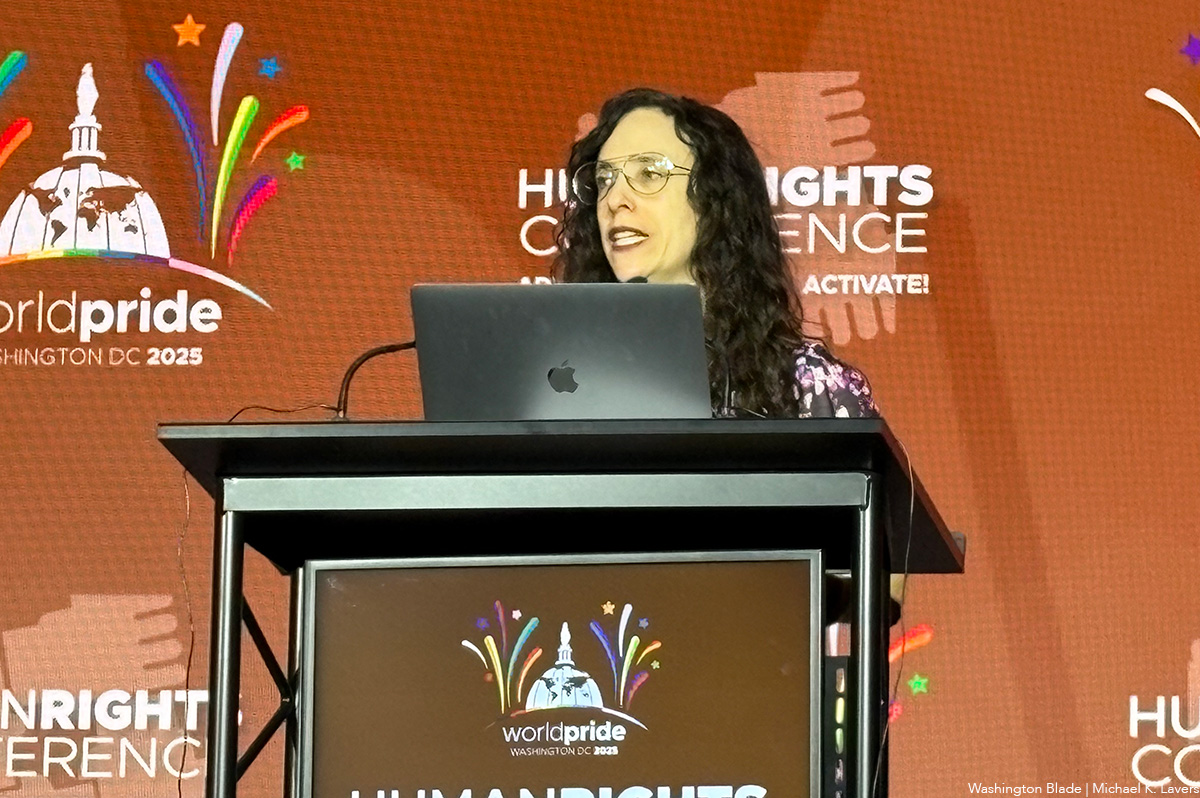
The Council for Global Equality in a statement condemned “the drastic restructuring and glaring omission of violence and abuse targeting lesbian, gay, bisexual, transgender, queer, and intersex (LGBTQI+) persons in the U.S.”
“We denounce the Trump administration’s efforts to politicize the State Department’s annual human rights reports by stripping longstanding references to human rights abuses targeting LGBTQI+ and other marginalized groups,” said Mark Bromley, the group’s co-chair.
Gay U.S. Rep. Mark Takano (D-Calif.), who chairs the Congressional Equality Caucus, echoed Bromley and Stern.
“Omitting the persecution of LGBTQI+ people from the human rights reports doesn’t erase the abuse, violence, and criminalization our community is facing around the world — it condones it,” said Takano in a statement.
“Erasing our community from these reports makes it that much harder for human rights advocates, the press, and the American people to be aware of the abuses LGBTQI+ people are facing worldwide,” he added.
Congress requires the State Department to release a human rights report each year. Foggy Bottom usually releases it in the spring.
Politico in March reported the Trump-Vance administration planned to cut “sections about the rights of women, the disabled, the LGBTQ+ community, and more” from the human rights report. State Department spokesperson Tammy Bruce, who President Donald Trump has nominated to become deputy representative at the U.N., on Tuesday during her last press briefing defended the report and the delay in releasing it.
“We weren’t going to release something compiled and written by the previous administration,” said Bruce. “It needed to change based on the point of view and the vision of the Trump administration, and so those changes were made.”
“It certainly promotes, as does our work, a respect for human rights around the globe,” added the former Fox News contributor who has described herself as a “gay woman.”
The Council for Global Equality and Democracy Forward has filed a Freedom of Information Act lawsuit. A press release notes it is “seeking the release of additional information … including any instructions provided by political appointees to strip references to abuses against LGBTQI+ persons from the reports.”
“The reports make LGBTQI+ persons and other minorities invisible and, in so doing, they undermine the human rights landscape that protects all of us,” said Bromley.
“Erasing our community from these reports makes it that much harder for human rights advocates, the press, and the American people to be aware of the abuses LGBTQI+ people are facing worldwide,” added Takano. “Failing to rectify this censorship will have real — and potentially deadly — consequences for LGBTQI+ people, including both for those who travel abroad from the U.S. and for LGBTQI+ people in countries whose leadership no longer need to worry about consequences for their human rights abuses. The State Department must reverse course and restore the LGBTQI+ section to these reports.”
A State Department spokesperson told the Washington Blade the “information included in the 2024 reports has been restructured and streamlined for better utility and accessibility, and to be more responsive to the legislative mandate for the (human rights report.)”
“The result directly addresses the reporting requirements as laid out in statute as well as being more streamlined, objective, universal, and accessible to the American public,” said the spokesperson.
The spokesperson did not comment on the FOIA lawsuit the Council for Global Equality and Democracy Forward has filed.

U.S. Citizenship and Immigration Services on Monday announced it will ensure “male aliens seeking immigration benefits aren’t coming to the U.S. to participate in women’s sports.”
The announcement notes USCIS “has clarified eligibility for certain visa categories: O-1A aliens of extraordinary ability, E11 aliens of extraordinary ability, E21 aliens of exceptional ability, and for national interest waivers (NIWs), to guarantee an even playing field for all women’s athletics in the United States.” The new policy comes roughly six months after President Donald Trump issued an executive order that bans transgender women and girls from female sports teams in the U.S.
“Men do not belong in women’s sports. USCIS is closing the loophole for foreign male athletes whose only chance at winning elite sports is to change their gender identity and leverage their biological advantages against women,” said USCIS spokesperson Matthew Tragesser. “It’s a matter of safety, fairness, respect, and truth that only female athletes receive a visa to come to the U.S. to participate in women’s sports.”
“The Trump administration is standing up for the silent majority who’ve long been victims of leftist policies that defy common sense,” added Tragesser.
USCIS in April announced it will only recognize “two biological sexes, male and female.” Trump shortly after he took office for a second time on Jan. 20 signed the “Defending Women from Gender Ideology Extremism and Restoring Biological Truth to the Federal Government” executive order.
The 2028 Summer Olympics will take place in Los Angeles.
The U.S. Olympic and Paralympic Committee last month banned trans women from competing in women’s sporting events.
The Guardian earlier this year reported the State Department ordered consular officials “to deny visas to transgender athletes attempting to come to the U.S. for sports competitions, and to issue permanent visa bans against those who are deemed to misrepresent their birth sex on visa applications.”
Germany and Denmark are among the countries that have issued travel advisory for trans and nonbinary people who are planning to visit the U.S. The warnings specifically note the Trump-Vance administration has banned the State Department from issuing passports with “X” gender markers.
“This policy update clarifies that USCIS considers the fact that a male athlete has been competing against women as a negative factor in determining whether the alien is among the small percentage at the very top of the field,” reads the USCIS announcement. “USCIS does not consider a male athlete who has gained acclaim in men’s sports and seeks to compete in women’s sports in the United States to be seeking to continue work in his area of extraordinary ability; male athletes seeking to enter the country to compete in women’s sports do not substantially benefit the United States; and it is not in the national interest to the United States to waive the job offer and, thus, the labor certification requirement for male athletes whose proposed endeavor is to compete in women’s sports.”
The new USCIS guidance takes effect immediately.
California Politics
How Triston Ezidore became the first gay, Black board member in Culver City at 19 years old, making history—twice!
At 19, Ezidore felt like it was his responsibility to track the educational movements in the Culver City Unified a bit more closely
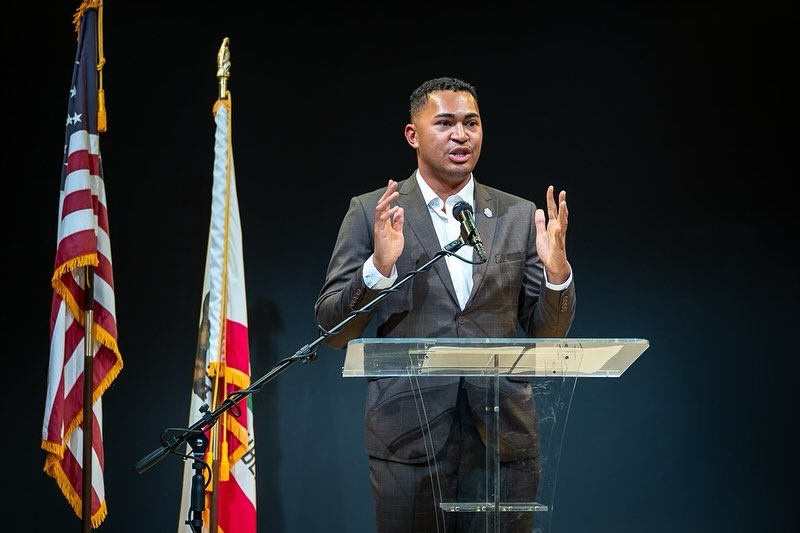
While most teenagers are busy playing video games, Triston Ezidore was busy making history.
From high school student to school board member for the Board of Education in Culver City, Ezidore talks with the LA Blade about his unconventional entry into politics with influence from George Floyd’s death and the COVID-19 pandemic, and how he made history twice while he was still a teenager.
In 2021, most of us were still at home and many people unemployed, out of school, caring for loved ones or just merely surviving the pandemic shutdowns and peak infections caused by COVID-19. During this time, many high school students lost valuable time in the classroom, being cut off from celebrating and socializing with their peers. Young Ezidore, rose above that—and more—achieving new milestones within his family and within the entire board of education in Culver City, bringing representation to queer, trans and communities of color.
Shortly after graduation, Ezidore headed to Syracuse University and from afar, he continued to tune into the Culver City school board meetings to track the progress he had made during his time as student body president in high school.
“I was still kind of watching, tuning into everything that was going on in Culver City and we knew that in order to get [the progress] right, we had to have a spotlight over the implementation,” said Ezidore.
It was during this time, that he noticed that all the progress he tried to implement during his time there, was not being implemented correctly, so he felt like it was his responsibility to track the movements a little more closely.
This is when he made the decision to return home and enroll at University of Southern California’s Dornsife College of Letters, Arts and Sciences—where he simultaneously launched his campaign for a seat on the Culver City Unified School District Board of Education.
In 2022—just one year after graduating high school—he won one of three open seats, becoming the youngest elected official in Los Angeles County at 19 years old. Then in 2023, he was elected to serve as School Board Vice President—making history as the first Black, gay man in that position as a teenager.
Though his journey into politics is “unconventional” as he puts it, Ezidore says he was radicalized to go into politics because of George Floyd’s death and the inequities made incredibly obvious by the COVID-19 pandemic.
Ezidore says that being the child of immigrants also inspired him to ultimately look into politics to gain a better understanding of how his perspective can be helpful towards other people’s experiences and educational goals.
His mother was born in Vietnam and moved to the United States after the fall of Saigon, which was the end of the Vietnam war that lasted from 1955 to 1975. Ezidore’s father is from Jamaica, so that gives Ezidore a unique perspective into the challenges and unique obstacles that many students face during their K-12 education.
Ezidore also identifies as gay and has been out since he was 18 years old.
“I find myself identifying as a gay, Black man, and I know that under this administration specifically, there has been an obsession with LGBTQ people and trans people in education,” said Ezidore. “I think historically our [education] system has not supported Black boys in education as a whole, so I find myself often pulling or tapping into those aspects of my identity.”
As a proud, gay, Black man, he felt that it was necessary to implement actual structures to support the most neglected demographic of the education system.
“We instituted the Black Student Achievement Plan that called for specific action goals to implement or to increase achievement,” said Ezidore.
This plan created mentorship and internship opportunities, a Black student council, a Black affinity group graduation and uplifted students in achieving their goals. During that time, former governor Jerry Brown stated that school districts should implement a Local Control and Accountability Plan (LACP). The plan serves as a tool to improve student outcomes with a roadmap that tracks and sets goals and plan actions, and leverages resources to guide students who were foster youth, low-income and English-learners.
“I don’t know that [Trump] is going to withhold the funding, but to me, I don’t know if I could sleep at night if I let him dictate these [educational] outcomes for the students in Culver City,” he said.
The latest update from the Supreme Court is that Trump is allowed to continue dismantling the U.S. Department of Education, worrying scholars throughout the country, with many saying that without an injunction, much of the damage can be irreversible. The Department of Education has already experienced the slashing of over 1,400 jobs and will continue to see more funding cuts due to the Reduction in Force (RIF) plan, implementing Trump’s Executive Order, which he claims will improve education and families by returning education authority to individual states.
Congress
White House finds Calif. violated Title IX by allowing trans athletes in school sports
Education Department threatens ‘imminent enforcement action’

The Trump-Vance administration announced on Wednesday that California’s Interscholastic Federation and Department of Education violated federal Title IX rules for allowing transgender girls to compete in school sports.
In a press release, the U.S. Department of Education’s Office of Civil Rights threatened “imminent enforcement action” including “referral to the U.S. Department of Justice” and the withholding of federal education funding for the state if the parties do not “agree to change these unlawful practices within 10 days.”
The agency specified that to come into compliance; California must enforce a ban excluding transgender student athletes and reclaim any titles, records, and awards they had won.
Federal investigations of the California Interscholastic Federation and the state’s Department of Education were begun in February and April, respectively. The Justice Department sued Maine in April for allowing trans athletes to compete and refusing a similar proposal to certify compliance within 10 days.
Broadly, the Trump-Vance administration’s position is that girls who are made to compete against trans opponents or alongside trans teammates are unfairly disadvantaged, robbed of opportunities like athletics scholarships, and faced with increased risk of injury — constituting actionable claims of unlawful sex discrimination under Title IX.
This marks a major departure from how the previous administration enforced the law. For example, the Department of Education issued new Title IX guidelines in April 2024 that instructed schools and educational institutions covered by the statute to not enforce categorical bans against trans athletes, instead allowing for limited restrictions on eligibility if necessary to ensure fairness or safety at the high school or college level.
Sports aside, under former President Joe Biden the department’s Office of Civil Rights sought to protect against anti-LGBTQ+ discrimination in education, bringing investigations and enforcement actions in cases where school officials might, for example, require trans students to use restrooms and facilities consistent with their birth sex or fail to respond to peer harassment over their gender identity.
Much of the legal reasoning behind the Biden-Harris administration’s positions extended from the 2020 U.S. Supreme Court case Bostock v. Clayton County, which found that sex-based discrimination includes that which is based on sexual orientation or gender identity under Title VII rules covering employment practices.
A number of high profile Democrats, including California Gov. Gavin Newsom, have recently questioned or challenged the party’s position on transgender athletes, as noted in a statement by Education Secretary Linda McMahon included in Wednesday’s announcement.
“Although Gov. Gavin Newsom admitted months ago it was ‘deeply unfair’ to allow men to compete in women’s sports, both the California Department of Education and the California Interscholastic Federation continued as recently as a few weeks ago to allow men to steal female athletes’ well-deserved accolades and to subject them to the indignity of unfair and unsafe competitions.”
Congress
Garcia elected top Democrat on the House Oversight Committee
Gay Calif. lawmaker vows to hold Trump-Vance administration accountable

U.S. Rep. Robert Garcia (D-Calif.) on Tuesday was elected top Democrat on the House Oversight Committee in a vote that signaled the conference’s overwhelming support for a newer voice on Capitol Hill who will play a key role taking on President Donald Trump.
With a margin of 150-63, the 47-year-old openly gay congressman defeated U.S. Rep. Stephen Lynch (D-Mass.), alongside U.S. Reps. Jasmine Crockett (D-Texas) and Kweisi Mfume (D-Md.) who exited the race after the House Democratic Steering and Policy Committee backed Garcia.
Serving only since 2023, the congressman has had a remarkably quick ascent leading up to his election this week as ranking member of one of the most powerful House committees, awarded a leadership position serving under House Democratic Whip Katherine Clark (Mass.) and selected as a co-chair of former Vice President Kamala Harris’s 2024 presidential campaign.
Democratic members began jockeying for the top seat on the oversight committee this spring after the late-U.S. Rep. Gerry Connolly of Virginia stepped away amid news that his esophageal cancer had returned. He died in May.
Connolly last year fended off a challenge from one of the most well known House Democrats, U.S. Rep. Alexandria Ocasio-Cortez (N.Y.), though with a narrower margin that signaled intra-party tensions over whether leadership roles should still be awarded based on seniority.
Garcia positioned himself as a bridge between the two camps — a consensus candidate with executive managerial experience as the former mayor of Long Beach. At the same time, particularly since the start of Trump’s second term, the congressman has emerged as one of the most outspoken critics of the new Republican regime.
In a statement on X Tuesday, Garcia thanked his colleagues and promised to “hold Donald Trump and his administration accountable.”
I'm honored to have been elected by @HouseDemocrats to serve as Ranking Member on @OversightDems.
— Congressman Robert Garcia (@RepRobertGarcia) June 24, 2025
We will hold Donald Trump and his Administration accountable for their corruption – and work to make our government more effective for the American people.
Let's get to work.
If Democrats win control of the House next year, the oversight committee will be able to exercise powers that are now available only to Republicans under the chair, U.S. Rep. James Comer (R-Ky.), which include the authority to investigate virtually any matter across the federal government, to issue subpoenas, and to compel testimony.
In the meantime, Garcia on Monday promised that Democrats on the committee would “vigorously fight” Republican Speaker Mike Johnson’s (La.) plans “to dismantle the Government Accountability Office.”
Congress
Padilla forcibly removed from federal building for questioning DHS secretary
Prominent Democrats rushed to defend senator

Democratic U.S. Sen. Alex Padilla of California was forcibly removed from a federal building in Los Angeles after attempting to ask questions of U.S. Homeland Security Secretary Kristi Noem during a press conference on immigration Thursday
The city has been rattled in recent days as protestors objecting to the Trump-Vance administration’s immigration crackdowns clashed with law enforcement and then the president deployed National Guard troops and U.S. Marines, which was seen as a dramatic escalation.
According to a video shared by his office, the senator, who serves as ranking member of the Senate Judiciary Immigration Subcommittee, introduced himself and said, I have questions for the secretary.” After he was pushed out of the room, officers with FBI-identifying vests told Padilla to put his hands behind his back and handcuffed him.
“Senator Padilla is currently in Los Angeles exercising his duty to perform Congressional oversight of the federal government’s operations in Los Angeles and across California,” reads a statement from his office.
“He was in the federal building to receive a briefing with General Guillot and was listening to Secretary Noem’s press conference,” the statement continued. “He tried to ask the secretary a question, and was forcibly removed by federal agents, forced to the ground and handcuffed. He is not currently detained, and we are working to get additional information.”
Democrats were furious, with many releasing strong statements online condemning the actions of law enforcement officers, including California Gov. Gavin Newsom (D), Los Angeles Mayor Karen Bass (D), and the state’s other U.S. senator, Adam Schiff (D).
Human Rights Campaign Chief of Staff Jay Brown also issued a statement: “A sitting U.S. senator should be allowed to ask a Cabinet secretary a question at a press conference — in his own state, on an issue affecting his constituents — without being violently thrown to the floor and handcuffed. Everyone who cares about our country must condemn this undemocratic act. Full stop.”
-

 Los Angeles4 days ago
Los Angeles4 days agoLGBTQ+ community calls out Radio Korea over host’s homophobic comments; station acknowledges but skirts accountability
-
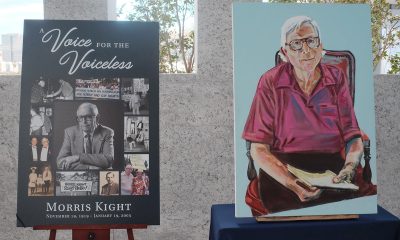
 Los Angeles5 days ago
Los Angeles5 days agoForgetting queer pioneer Morris Kight is “impossible”: Advocates and friends share stories at remembrance
-

 Movies4 days ago
Movies4 days agoEven Ariana Grande and Cynthia Erivo can’t save the fractured and messy ‘Wicked: For Good’: Film Review
-

 a&e features3 days ago
a&e features3 days agoJason Caceres is the rising talent you can’t look away from – not that you’d want to
-
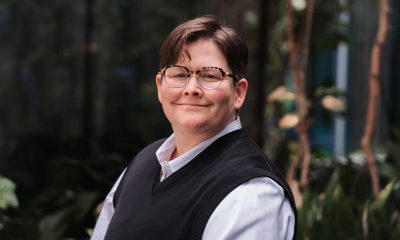
 Features2 days ago
Features2 days agoA blazing champion: Los Angeles LGBT Center’s Terra Russell-Slavin is leading this generation of queer activism
-

 Crime & Justice3 days ago
Crime & Justice3 days agoSoCal gay couple alleges Uber driver refused them service and “chased” them with a bat
-

 Commentary3 days ago
Commentary3 days agoBubba Trump: the Prez and the infamous files
-
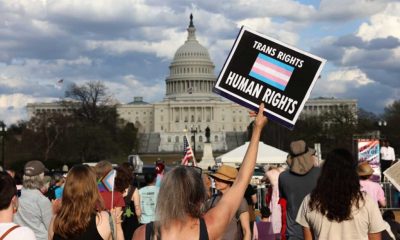
 Transgender12 hours ago
Transgender12 hours agoChristopher Street Project closed Trans Awareness Week with one of its strongest digital campaigns to date
-
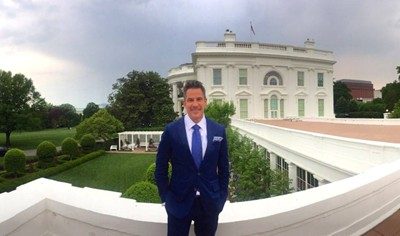
 Features15 hours ago
Features15 hours agoTrump’s shocking White House East Wing amputation — and the painful fallout Americans won’t ignore


